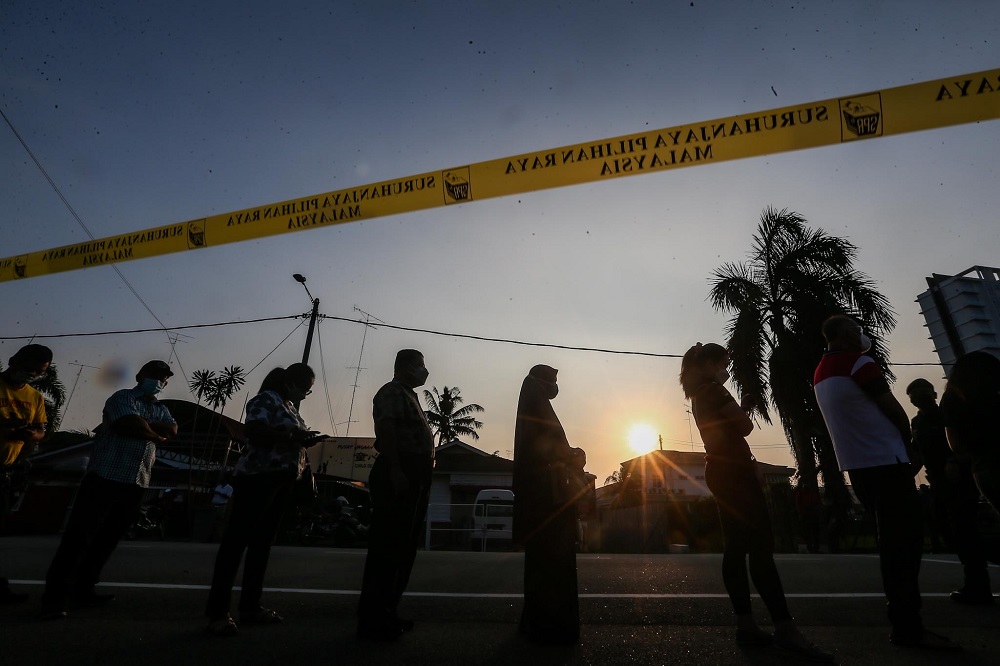The Covid-19 positive woman in her 30s was under the mistaken impression that she could vote in person despite being Covid-19 positive and still under home quarantine. – Picture by Hari Anggara
KUALA LUMPUR, March 12 — A Johorean voter who was under mandatory Covid-19 quarantine now has to pay a fine of RM1,000 after she went to the polling centre in Larkin earlier today believing she could cast her ballot, several news outlets reported.
The incident was reported to have happened at the Dewan Kampung Melayu polling centre, where the woman had showed up with her mother to vote for the Larkin state seat. The woman was reported to have returned home alone.
According to Malay daily Kosmo!, the woman in her 30s was under the mistaken impression that she could vote in person despite being Covid-19 positive and still under home quarantine.
Citing Johor Baru district health inspector Mohd Azrul, the newspaper reported that the woman’s MySejahtera health status was shown to be in the red.
The health inspector reportedly said the woman was offered a fine RM1,000 for the compoundable offence and told she would have to go to the Johor Baru district health office within 14 days.
He also ordered for her to go home immediately after getting the compound notice.
If someone commits an offence related to breaches of Covid-19 prevention rules, the authorities can choose to offer to let the offender compound the offence, in exchange for not being charged in court. The offender can then avoid being charged in court where they may face heavier penalties such as fines or imprisonment, if they pay the compound amount offered.
The Health Ministry confirmed the incident involving the issuance of the RM1,000 compound to the woman.
News portal Free Malaysia Today also reported the incident, adding that the Health Ministry had instead denied having issued a directive on a method to facilitate voting by Covid-19 positive persons in the Johor state elections.
Yesterday at around 4.30pm, the Health Ministry posted a Facebook post to inform the public to disregard the audio clip which had spread online and said it had never issued instructions for the Johor state elections as claimed in the audio clip.
The Health Ministry instead directed the public to the rules by the Election Commission (EC) and National Security Council (NSC) that were in force for the Johor state election.
In the EC’s and NSC’s 21-page rules as of March 7, page 19 stated that Covid-19 positive voters are not allowed to leave the place they are undergoing treatment such as hospital, quarantine centre or their house to vote, as they were said to be still infectious.
The rules however said voters who are patient under investigation (PUI) and person under surveillance (PUS) could however apply for permission from the health district officer monitoring their surveillance order to be allowed out temporarily to go to the polling centre, but noted that such permission is subject to the health district officer’s risk assessment and with such voters having to comply with all standard operating procedures.
Among other things, the rules also required PUI or PUS voters to vote in a special space and to go to the polling centre using their own transport if they are allowed out to vote, and with the permission to go out to vote requiring them to return to quarantine immediately after voting.
Page 18 of the same rules also said voters with symptoms are required to be isolated from other voters and to vote in a separate space that has to be disinfected after each of such voter votes, and with other safety procedures in place such as having such voters double-mask and with personnel dealing with them to wear personal protective equipment and to frequently sanitise their hands while wearing gloves.
Such symptomatic voters would also have their fingers marked with a disposable brush and would be given disposable gloves before holding the ballot paper and going to the ballot box to mark their vote, and would be managed by health officers such as undergoing saliva self-test after casting their votes.

